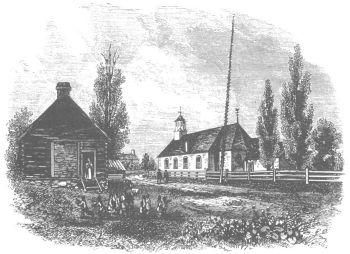While the South fulminates over Abraham Lincoln’s impending inauguration, some Southern Baptists are more concerned with internal religious matters, such as the issue of what constitutes true faith. From the pen of E. B. Tragce of Georgia this week:
“The Christian professor [believer] has always oscillated between orthodoxy with the few, and latitudinarianism with the many … [Campbellism], a latitudinous faith, tolerating regeneration by the spirit and justification by faith, on the one hand, and remission of sins in and through baptism on the other, it was supposed, would promote harmony and freedom of inquiry. Unitarianism in New England has had for its pabulum among other things, this same catering to the longing desire for a broader road to heaven.
On the other hand, all these latitudinous schemes are unsatisfying to the spiritual wants of man. Unitarianism has sometimes acknowledged its deficiency in depth of devotion. Campbellism, ever and anon, gives intimation of a like conviction. The old “half-way covenant” practice of the Congregationalists, distressed good men in the same way. Nothing can compose and place at perfect rest the human heart, but a conviction of the infinite justice of God awarded on our behalf by the blood of Emmanuel.”
White Baptists of the South have the luxury of discussing the fine points of faith and doctrine, while African Baptist slaves, viewed by whites as less than human, are denied the right to learn to read and study the Bible. Lacking the input of enslaved Baptists, the voices within Baptist newspapers in the South during the war reflect a racially-imbalanced Christianity that enthusiastically defends the Baptist faith against other denominations while offering scarce criticism of the proverbial elephant in the room – the white supremacist culture of the South.
Source: “Are There Few That Be Saves,” Christian Index, February 20, 1861; Illustration (link)



